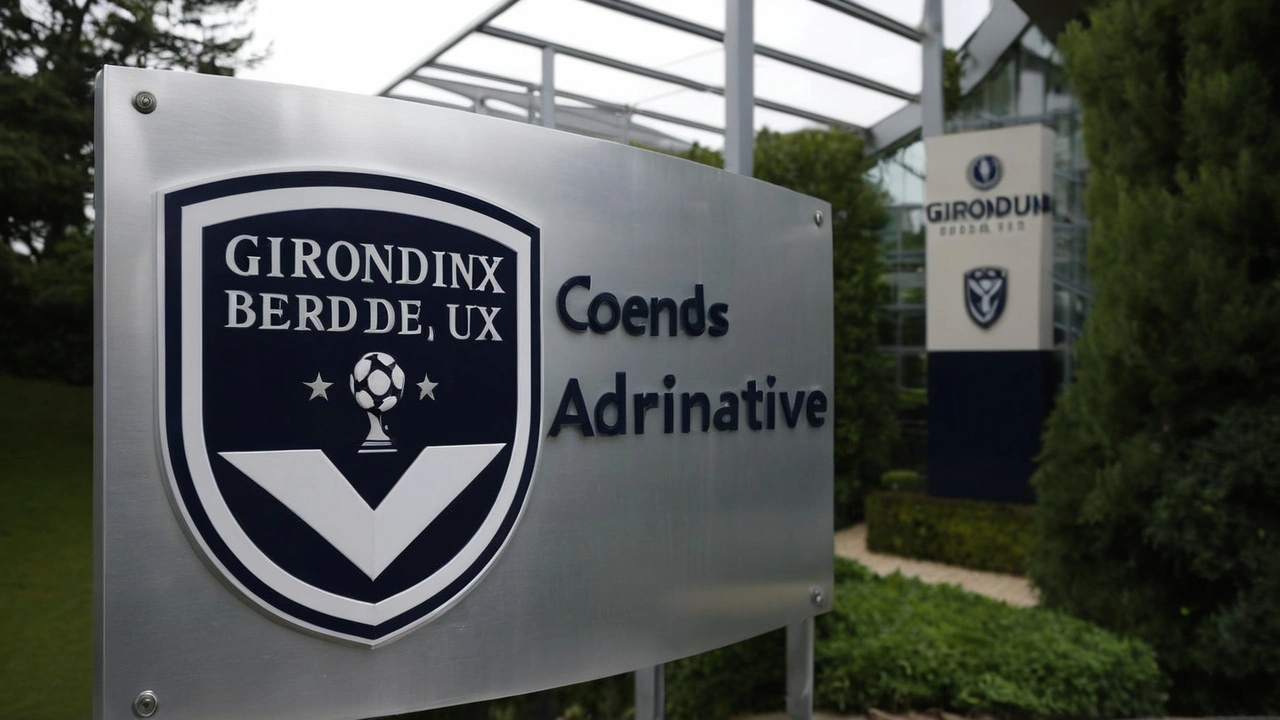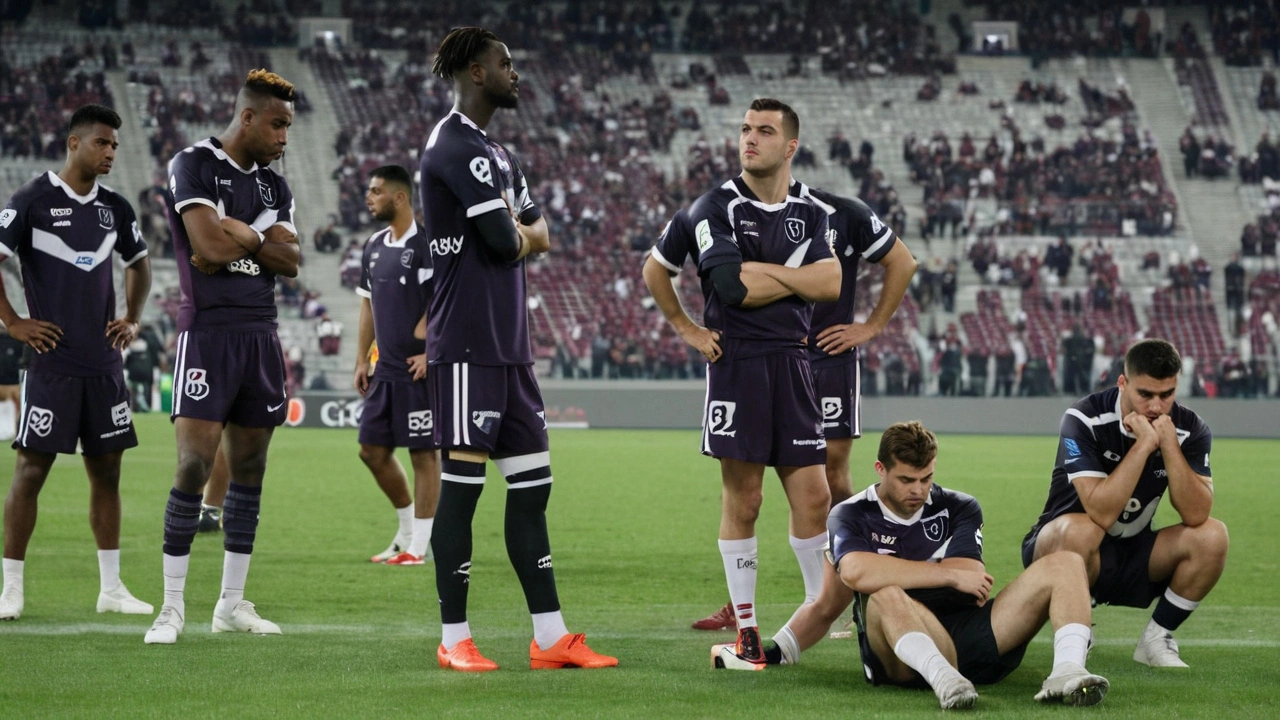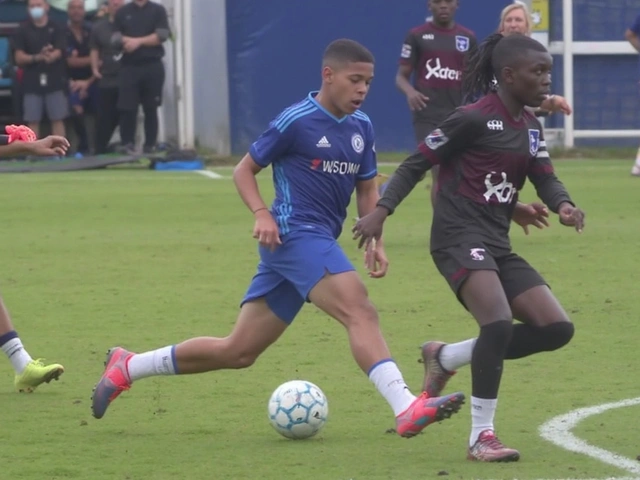Bordeaux's Grueling Journey: From Relegation to Surrendering Professional Status
The football world watched in disbelief as Bordeaux, a team that once boasted a strong presence in Ligue 1, officially renounced its professional status. Just a few days after facing the harsh reality of relegation to the third tier of French football, the historic club decided to terminate player contracts in a move that underlines their dire financial predicament and significant fall from grace.
Bordeaux's journey has been marked by financial instability for several years, a situation worsened by various unsuccessful attempts at salvation. The club’s decline was further exacerbated by the breakdown of takeover talks with Fenway Sports Group (FSG), the owners of Liverpool FC. This failed negotiation crushed hopes of a revival and marked the end of any potential financial rescue from their prospective new owners.
The collapse of this crucial takeover deal left Bordeaux in a vulnerable position. Stripped of the much-needed investment and support, the club had no choice but to face the grim reality of their situation. Relegation to the third tier served as the final nail in the coffin, prompting the decision to abandon their professional status. The termination of player contracts followed suit, as the club could no longer sustain professional football operations amid their declining economic health.
The impact of this decision is profound, not only for the club's players and staff but also for its fans, who have witnessed Bordeaux’s journey from the top echelons of French football to its current plummet. This dramatic shift has left many reminiscing about the club’s glorious past, including championship triumphs and memorable matches that had once brought pride and joy to its supporters.
Founded in 1881, Bordeaux has a rich history and has been a significant player in Ligue 1, securing six league titles, four Coupe de France titles, and three Coupe de la Ligue titles. Their successes on the domestic front have also translated into notable performances in European competitions. Players like Zinedine Zidane and even current stars in international football once donned the blue of Bordeaux, making a name for themselves before moving to larger stages.
However, in recent years, the club's financial woes began to overshadow its on-field achievements. Mounting debts and poor management decisions created a vortex of challenges that Bordeaux struggled to navigate. The COVID-19 pandemic further strained resources, pushing the club to the brink. Although the hope was rejuvenated with the potential FSG takeover, the collapse of that deal forced the club into a corner.
The decision to renounce professional status carries significant implications. For many players, this means the abrupt end of their contracts and an uncertain future. For the coaching staff and club officials, it marks a deep introspection into what led to such a drastic downfall. For the fans, it is an emotional moment, a painful realization of how quickly fortunes can change in the world of sports.
The Financial Quagmire and Its Lasting Impact
Bordeaux's financial troubles have been an open secret for years. Despite attempts to manage the crisis, the escalating debts became insurmountable. A series of ownership changes did little to stabilize the club. Each new owner promised a turnaround, but the consistent lack of strategic direction and effective management left Bordeaux lurching from one crisis to another.
The breakdown of the FSG deal was particularly bitter. For a brief period, it seemed like the club had found a lifeline. FSG's track record with Liverpool, transforming them into European and Premier League champions, raised hopes of a similar revival for Bordeaux. However, the complexity of financial negotiations, compounded by existing debts and ongoing management issues, caused the talks to falter.
The decision to relinquish professional status is financially motivated. Running a professional football club involves hefty operational costs, including player salaries, coaching staff wages, training facilities, and matchday operations. Given Bordeaux's financial state, sustaining these costs became untenable. By renouncing their professional status, the club hopes to rebuild more sustainably, focusing on their youth academy and grassroots football, with aspirations of a gradual return to professionalism once the financial situation is stabilized.
However, this process will not be easy or quick. Renegotiating player contracts, dealing with contractual obligations, and managing debts will all be part of a challenging restructuring process. The club will have to navigate regulatory frameworks and potentially face penalties or sanctions as part of their reformation efforts.
A Call to the Football Community
Bordeaux’s predicament serves as a stark reminder of the delicate balance football clubs must maintain between financial management and on-field success. It is a call to action for other clubs, particularly those with historic legacies, to prioritize sustainable financial practices even as they pursue sporting glory.
The French football community, and indeed the global football fraternity, has a role to play. Support from various stakeholders, be it through attendance, sponsorship, or community engagement, can make a significant difference. Grassroots initiatives and youth development programs need to be emphasized to ensure that clubs have a strong foundation of homegrown talent, reducing dependency on expensive transfers.
For Bordeaux, the journey ahead is fraught with challenges. Yet, football has a way of surprising us. Clubs have bounced back from the brink before, and with the right strategies and community support, there remains a glimmer of hope for Bordeaux to write a comeback story.
As the dust settles on this significant development, the focus will shift to how the club plans to navigate its immediate future. Their decisions and actions in the coming months will be critical in determining whether they can eventually rise from the ashes of their current predicament.

Conclusion
In the end, the steep fall of Bordeaux is a somber tale of financial mismanagement, compounded by unfortunate circumstances. A club with a rich history and bright moments in football’s annals, Bordeaux's decision to renounce their professional status is a moment of reckoning.
The story of Bordeaux is not just about a football club losing its professional status; it is a reflective narrative on the broader issues facing modern sports. Financial prudence, effective management, and community engagement are essential pillars of a successful sporting entity. Bordeaux’s experience serves as both a cautionary tale and an inspiring challenge to other clubs to build their foundations robustly to withstand the volatile nature of the sports world.
For the fans, while this marks an end of an era, it also signifies the beginning of a new chapter. One that, though difficult, holds the potential for rebuilding and resurgence. Football, after all, has always been about hope, resilience, and the unwavering spirit of its community.







Posts Comments
Mark Dodak July 27, 2024 AT 13:00
Bordeaux’s fall is one of those slow-motion train wrecks you can’t look away from. I remember watching them in the early 2000s-Zidane, Diouf, the whole squad just oozing class. Now? They’re down to playing in front of a few hundred people with half the squad on free transfers. It’s not just about money; it’s about identity. Clubs like this aren’t businesses, they’re institutions. And when you let institutions rot because you’re too lazy to fix the roof before it caves in, you don’t get to cry when the foundation gives out.
There’s no magic fix here. No FSG savior, no billionaire prince on a white horse. It’s going to take years of austerity, brutal honesty, and a complete overhaul of how they recruit, train, and manage. The academy has to become the heart again, not an afterthought. And fans? They’ve got to stop pretending they’re still a top-tier club while living in denial. Real change starts when you stop romanticizing the past and start building the future, even if it’s ugly.
I’ve seen this happen before-smaller clubs in the States, like the old Tampa Bay Mutiny. They had history, pride, talent. Then came mismanagement, bad ownership, and a culture of entitlement. Now? They’re dust. Bordeaux could be next. But if they’re smart, they’ll use this as a reset. Rebuild from the ground up. No more luxury cars for directors. No more inflated contracts for aging journeymen. Just kids from the suburbs who love the game and a coaching staff that actually cares. It’s possible. It’s just going to hurt like hell before it gets better.
Stephanie Reed July 28, 2024 AT 02:30
I just hope the players get some kind of support during this transition. Many of them are young, maybe even just out of youth academies, and now they’re suddenly unemployed with no clear path forward. It’s heartbreaking to think of someone who’s trained their whole life for this, only to have the rug pulled out from under them because of decisions they had zero control over.
Maybe this is the moment for local businesses and alumni to step up-not with grand donations, but with real, consistent support. Sponsor a training kit, host a youth clinic, offer internships. Football doesn’t have to be about billions to matter. It’s about community. And Bordeaux still has one, even if it’s bruised.
Jason Lo July 28, 2024 AT 23:08
This is what happens when you let liberals run a football club. No discipline, no accountability, just feel-good nonsense about ‘community’ and ‘grassroots.’ Meanwhile, real clubs like PSG and Man City spend billions and win trophies. Bordeaux didn’t fail because of bad luck-they failed because they were weak. Weak leadership. Weak culture. Weak spine. If you can’t handle the heat of professional football, you shouldn’t be in the kitchen. Time to hand the keys to someone who understands that football isn’t a charity-it’s a war.
Brian Gallagher July 30, 2024 AT 03:09
From an institutional governance perspective, Bordeaux’s decision to relinquish professional status represents a strategic de-risking maneuver within a highly leveraged, revenue-constrained operational environment. The club’s capital structure, characterized by unsustainable wage-to-revenue ratios and an absence of diversified income streams, rendered continued operation under Ligue 2+ standards financially infeasible.
The failed FSG acquisition underscores a critical failure in strategic alignment: private equity entities require demonstrable scalability, data-driven youth development pipelines, and monetizable fan engagement ecosystems-all of which Bordeaux systematically neglected. Their asset base-stadium, academy, brand equity-remains intact, but the operational architecture is obsolete.
Rebuilding requires a paradigm shift: transition to a non-profit, community-owned model with a clear governance charter, capped wage structures, and a mandatory 70% homegrown player quota in first-team squads. This is not regression-it’s evolution. Clubs like FC Barcelona and Bayern Munich have demonstrated that long-term sustainability is achievable without financial recklessness. Bordeaux has a chance to become a model for post-capitalist football in Europe-if they have the courage to embrace structural humility.
Elizabeth Alfonso Prieto July 30, 2024 AT 08:51
THIS IS SO TRAGIC I CANT EVEN. I WAS A KID WHEN BORDEAUX WON THE TITLE IN 2009 AND NOW THEYRE JUST... GONE? I STILL HAVE MY ZIDANE JERSEY AND I CRY EVERY TIME I SEE THE OLD STADIUM PICS. WHO LET THIS HAPPEN? ITS NOT JUST MONEY ITS LIKE THEY FORGOT HOW TO LOVE THE GAME. SOMEONE NEEDS TO PUNISH THE PEOPLE WHO DID THIS. NOT THE PLAYERS. NOT THE FANS. THE BOSS. THE DIRTY COWARDS WHO TOOK THE MONEY AND RAN. I HATE THEM. I HATE THEM I HATE THEM.
plz someone start a petition. i dont care if its illegal. we need justice.
Harry Adams August 1, 2024 AT 07:09
How quaint. A French club, once the jewel of the Ligue 1 crown, reduced to begging for scraps in the third division. One can’t help but notice the irony: the very same cultural arrogance that once made Bordeaux a symbol of Gallic superiority now manifests as a pathetic inability to adapt. They clung to the myth of ‘tradition’ while ignoring the globalized, data-driven realities of modern football.
Let’s be honest-no self-respecting investor would touch them with a ten-foot pole. The management culture is archaic, the branding is inert, and their youth academy, once the envy of Europe, has been allowed to atrophy. They didn’t fall because of FSG’s withdrawal-they fell because they were already dead. The only surprise is that it took this long for the corpse to be buried.
Kieran Scott August 2, 2024 AT 09:03
Let’s cut through the sentimental bullshit. Bordeaux didn’t ‘fall from grace’-they were never worthy of grace to begin with. Six league titles? So what? That was 40 years ago. They’ve spent the last two decades as glorified mid-table filler with a fancy crest. The only reason anyone cared was because Zidane played there-otherwise, they were a footnote.
And now they want to play the martyr card? Please. They had every opportunity to fix this. They had owners, sponsors, TV deals, even a potential takeover by one of the most successful sports groups in the world. And what did they do? They sat on their hands, kept paying overpaid mediocrities, and pretended they were still elite. This isn’t tragedy. It’s poetic justice.
And don’t even get me started on the ‘grassroots’ nonsense. You don’t ‘rebuild’ a club by telling kids to play in the park. You rebuild by investing in analytics, scouting networks, and professional coaching. Bordeaux’s entire philosophy was built on nostalgia, not strategy. Now they’re paying for it. Good.
Joshua Gucilatar August 2, 2024 AT 23:11
Bordeaux’s collapse is the most beautiful dumpster fire in modern football history. It’s like watching a Renaissance painting get tossed into a woodchipper-gorgeous, tragic, and utterly preventable. They had everything: the legacy, the talent, the stadium, the fanbase. But they treated their club like a personal ATM, not a living organism.
Every time they hired a new CEO, it was like installing a new app on a 2005 Nokia-no updates, no security patches, just a fresh coat of paint over a dying motherboard. The FSG deal? That wasn’t a lifeline-that was a final exam they didn’t study for. They thought money would magically fix culture, and now they’re stuck with a skeleton crew and a debt mountain taller than the Eiffel Tower.
But here’s the kicker: they might actually win this. If they go full ‘FC Barcelona 2000’-sell the stadium, fire everyone, and rebuild with kids who bleed blue-this could become the greatest underdog story since Leicester. But only if they stop pretending they’re still in Ligue 1. The truth is their soul is still intact. It’s just buried under a mountain of bad decisions and worse PR.
jesse pinlac August 2, 2024 AT 23:11
It is a matter of profound regret that an institution of such historical significance has succumbed to the corrosive influence of short-termism and institutional incompetence. The decision to relinquish professional status is not an act of humility-it is an admission of systemic failure on every conceivable governance metric. The club’s leadership exhibited a chronic inability to align fiscal prudence with sporting ambition, a failure that is emblematic of a broader malaise afflicting European football.
Furthermore, the narrative of victimhood propagated by certain factions-particularly those invoking the FSG collapse as an external catalyst-is intellectually dishonest. The FSG did not fail Bordeaux; Bordeaux failed itself. Their inability to present a viable, transparent, and sustainable business model rendered any potential partnership untenable. This is not a story of lost opportunity-it is a case study in organizational decay.
Jess Bryan August 4, 2024 AT 21:59
They didn’t just go broke-they were sabotaged. You think FSG really walked away because of ‘financial complexity’? Nah. That was a cover. The real reason? They found out the club’s financial records were doctored. The debt wasn’t just high-it was fake. And the people running it? They were laundering money through player transfers. The third tier isn’t a reset-it’s a cover-up. The government knows. The league knows. But they’re letting it slide because Bordeaux’s owner has ties to offshore shell companies. This isn’t football. It’s a crime scene with a mascot.
Write a comment